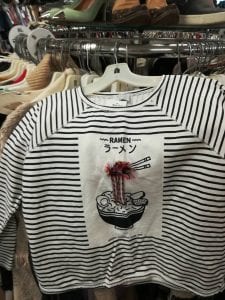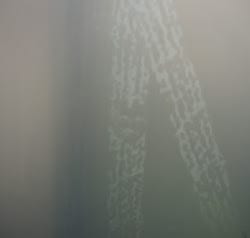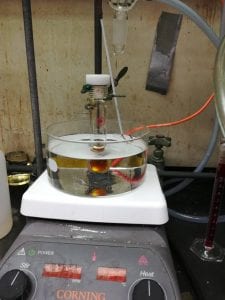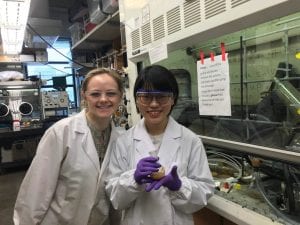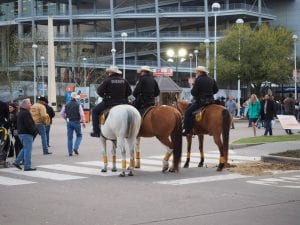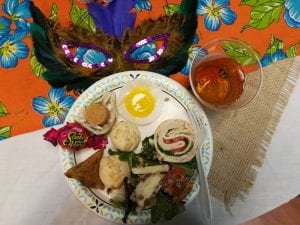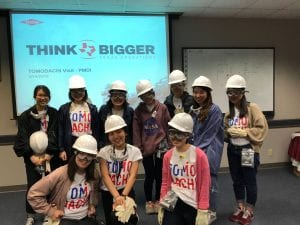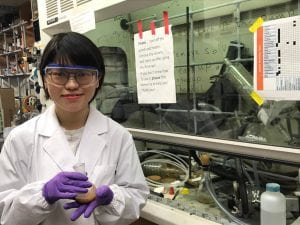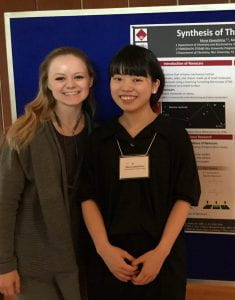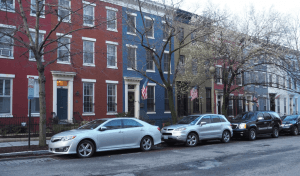[:en]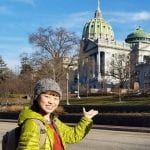 Mana Kawashima
Mana Kawashima
Hometown in Japan: Tokyo
University in Japan: Waseda University
Major & School Year: Organic Chemistry, B4: Senior
Host Advisor: Prof. James Tour, Dept. of Chemistry
Host Lab: Tour Research Group
Research Project: “Synthesis of Third Generation of Dipolar Nanocars”
Why TOMODACHI STEM @ Rice University?
The TOMODACHI STEM program gives the great opportunity to experience the environment of graduate students in the U.S. Through the experience, I would like to deepen my understanding of science and graduate school in the U.S.
This program will give me a precious time to see and experience the forefront of research. I believe the U.S. is one of the global leaders in science, and it gathers together top-notch researchers, facilities, and human resources. Rice University is one of the top research universities in the U.S. and through the TOMODACHI STEM Program @ Rice University, I will improve my experimental techniques, English skills, and communication skills. I believe this experience will strengthen my future career opportunities and I also think it will be very useful for my future undergraduate senior thesis research. I would like to make the best effort for experiments both during and after the TOMODACHI STEM program. In addition, I want to connect with young scientists who will be the leaders of the next generation in the field of science. Through the laboratory life and special program activities, I would like to make good relationships with other participants. I hope that we can share and discuss about the experience of graduate student life and research in the U.S.
Goals
- Learn more skills for academic English and discuss have discussions about their research with faculty and my fellow participants.
- Experience the world-class lab environment in the U.S. to brush up my scientific skills and knowledge.
- Experience an environment in which female scientific leaders play an important role.
Excerpts from Mana’s Weekly Reports
- Week 01: Arrival in the U.S.
- Week 02: First Week at Research Host Lab
- Week 03: Interview With a Female Researcher
- Week 04: Research in the U.S. vs. Research in Japan
- Final Research Poster Presentation
- Week 05: Science & Technology Policy Study Tour
- Final Report
- Tips for Future Participants
Week 01: Arrival in the U.S.
This is my third time to visit the U.S. and, on one visit, I had the experience of an American university student’s life when I stayed at my cousin’s university for a week. Therefore, the behaviors or gestures of Americans and the undergraduate student’s life was not so surprising for me. However, I was really surprised at the system of graduate school in the U.S. In the first week, Prof. Kono gave us a lecture on the meaning of the research and graduate school in the U.S. In the U.S., most Ph.D. students in STEM don’t have to pay tuition if they are hired by a professor to work as a Research Assistant or, sometimes, hired as a Teaching Assistant. In addition, they can obtain a salary from the university in return for their research or teaching duties. This was the biggest surprise for me this week. In Japan, we must pay the expensive tuition without any salary. This lecture encouraged me a lot to get a Ph.D. in the U.S. in terms of the financial aspect.
On Sunday, I went to Montrose and enjoyed the shopping at the second-hand stores there. It was what I wanted to do in the U.S.! I found two differences between U.S. and the Japan. One was the size of the clothes. In Japan, my size is the most popular size. However, in the U.S., my size is the smallest size available. I felt the diversity of the U.S. The other difference was the selling style. In one of the shops, the clothes were sold by the pound. It was interesting, but I couldn’t judge whether it was really cheap or expensive, because the pound is not the international system of the units. I enjoyed the difference in the shops and got some wonderful clothes!
Initial Reflections on Intercultural Experiences in the U.S.
During my first week in the U.S., I encountered one of the core U.S. values, “Time is money”. I also encountered small talk with the drivers, clerks, and the people who I met on the elevator every day. It is very common to hear “Have a good day!” and “you too.”. I love these short conversations. Short conversations can also give me a great chance to build my network. I have another example. When I walked through the Rice campus with several friends, the Chinese American said to us “Hi, we’ve met at the English class!”. That was only my second time seeing him, however, I felt very familiar with him. In Japanese we have an idiom, “What happens twice will happen three times.”, if I met him next time, we can feel closer to each other. From this experience, I would like to say that “small talk” can build connections, so even though there may be little time it is priceless.
In addition, short conversations can give me a great chance to build my network. I have another example. When I walked through the Rice campus with several friends, the Chinese American said to us “Hi, we’ve met at the English class!”. That was only my second time seeing him, however, I felt very familiar with him. In Japanese we have an idiom, “What happens twice will happen three times.”, if I met him next time, we can feel closer to each other. From this experience, I would like to say that “small talk” can build connections, so even though there may be little time it is priceless.
Question of the Week
Why do Americans not use the International System of Units (SI)?
- See our section on Metric vs. Imperial System in the U.S. on our Life in the U.S.: From A-Z page!
Preparing for Research in the U.S. & First Few Days in the Lab
While I was still in Japan, I read some articles about nanomedicine that Prof. Tour sent to me. However, my research project changed because what I want to do and the originally planned project was different. So, I recommend you check the whole picture of the laboratory and be clear about what your main interest is when speaking with your host professor and mentor prior to arrival. If your professor or mentor are super busy and if you cannot discuss your research in first several days, then you must read papers and try to understand the concepts. We have only 3 1/2 weeks for research, so these days are very precious. When you communication your interests to the professor well, you can do a lot of research.
In the first several days in the lab, I just read articles about nanocars in the lab because my mentor and research topic were not yet fixed because Prof. Tour was out of town. I felt a little anxious because our research time is so short and I know that organic synthesis usually takes a long time. On the third day in the lab, we had a group meeting and I met Prof. Tour for the first time. I heard that most of American Professor wear casual cloth and sometimes, they are called by first name or nickname. Contrary to the expectations, he was called in a formal way and work a suit. He looked even more formal than Japanese professors. So, it was a little surprising for me and made me a bit worried. Although,
he welcomed me warmly and he gave me my mentor and I details about the project. I am determined to work hard!
My research group, the Tour group is a very big group. They have three sub-groups focusing on biochemistry, materials, and organic synthesis. The majority of members are in the materials group and the organic synthesis group, that I belong to, has only three people. It consists of 2 post-docs and 1 Ph.D. student, who is my mentor. So, my sub-group is very small. My mentor, Alexis who is a Ph.D. student from Philadelphia, is very good at teaching and encouraging me. She and one of the post-docs help me a lot; not only with chemistry but also with English. When I couldn’t understand their verbal explanations, they always tried to say it again in an easier way or explain with some chemical structures. Through this experience, I feel chemistry is world language from the bottom of my heart.
My research topic is “Nanocars”. Nanocar is literally the car in nano order. The classier, axles, and wheels are made by tiny molecules. It can run above the metals using electric interaction. The goal of my research in this internship is to synthesize the new type of nanocar in 10 steps. I will start my experiment with my wonderful mentor. I will do my best next week!
Return to Top
Week 02: First Week at Research Host Lab
By the second seek at Rice, I am usually working in my lab from 9ish to 5:00 PM each weekday. My typical routine is:
- 9:00 Stop the reaction then purify the reaction mixture.
- 12:00 Eat lunch at the lab.
- 1:00 – 5:00 PM
- Analyze the purified samples.
- Set up the reaction to run overnight.
- Research about the next reaction.
- About 5:00 PM: Go home.
On Tuesday, we have a group meeting and, on Thursday, we have a sub-group meeting. I usually attend both group meetings and during our sub-group meeting each lab member reports individually on their research progress. During this week, I gave my first research update. Actually, I had complete only one reaction at the time, so my report was really short. Even though I was nervous, it was a precious experience for me. I really appreciated my mentor for helping me a lot throughout my research update.

Trying out American cereal for breakfast. Fruits, Chocolate, Cinnamon and Plain with Banana Flavor ~ Mana Kawashima
I am working hard, not only on my experiments but also for my language development. During our experiments, we have some waiting time. During this time, I sometimes chat with my mentor about American culture, graduate student’ life, and so on. Usually I ask one question and then she speaks for 10, or sometimes more, minutes. I think it is not only a great opportunity to develop my conversation skills, but also to learn about the character of American people. She is very kind, patient, and good at understanding, so we can chat in English. I will keep on my challenge to further develop my conversation skills!
On Friday night I had so much fun! I played the billiards with my friends at the Rice Gym. It was my first time to play this game and I felt it was good experience for me. It required not only technique, but also good strategy. It was very interesting, and I will try it again next week. After that, we went to the Shepherd School symphony orchestra concert. I was so surprised that the concert was free! The program was “Sinfonia Concertante in E Minor, Op. 125” by Prokofiev and “Concerto for Orchestra.” By Bartok. The concert was amazing and the audience was great. The audience seemed to not be experts, but expressed their feeling by taking the rhythm, giving a standing ovation, and sharing their impressions by facial expressions or praise the performance with neighbors; even if they were a stranger. I felt, in the U.S., people are familiar with classical music and enjoy it in casual way. I love classical music, so I am very glad to experience this culture. I also felt that music is one of my communication tools this week too.
Research Project Update
I’m working on the synthesis of a Nanocar; a type of molecular machine. Molecular machines are a hot topic since the Nobel Prize in chemistry in 2016 went to a team of researchers working in this area. Due to the development of analysis techniques and accumulation of fundamental studies in this area, we can now synthesize more complicated molecules. The reported examples are elevators, motors, switches, cars, and so on. These compounds imitate mechanical mechanisms at the molecular level. In the Tour group, they won the Nanocar race that was held in France in 2017. So, this group is the one of the leading groups in this field. The Nanocar is expected to be used in transport applications to pick up atoms or other small molecules from a surface and deliver them to predefined points at the nanoscale. My research goal in this internship is to synthesize the analogues of the Nanocars which have already synthesized in the Tour lab.
The method is unpublished, so I cannot describe the specific method. So, in this part, I will explain the general procedure of organic synthesis. First, the chemicals are put into the flask. Then it is stirred in appropriate conditions (temperature, concentration and atmosphere). Then, we need to extract the product through various methods (Extraction, Purification, etc…). Finally, the product is analyzed to determine the structure and its characteristics.
In my research project, we need to run an air-sensitive reaction. So, in addition to the general manipulations described in the above, I have mastered usage of distilled solvents and learned how to make the inactive gas atmosphere. The glassware and some machines are a little bit different from the ones I usually use. However, I’m getting used to it and am really enjoying the experiment! Actually, I only did two reactions this week because I can only work on this experiment when my mentor is with me. In my laboratory in Japan, I usually run more than one reaction each day so this is a little frustrating. My mentor will be done working on her paper on Monday so then we will have more time to discuss about my research. Until that day, I will enjoy cooking instead of experiments.
Question of the Week
In the U.S., there are various races. So, I think there are a lot of differences between the American stereotype for the races and the Japanese stereotype. Do you have any example of the difference?
- Wow, this is a very big and complicated question and there are whole semester long classes on this topic. You might want to review some of the resources below on our Life in the U.S.: From A-Z and maybe talk about this topic with a good/trusted American friend. Diversity is one great aspect of the U.S. but there is a challenging and complicated history related to tolerance and acceptance that American society still struggles with today.
- History of the U.S. – Immigration
- Discrimination and Inequality in the U.S.
- 16 Books About Race in the U.S. That Everyone Should Read (HuffPost)
Week 03: Interview With a Female Researchers
Alexis is a graduate student in the Tour Group and she helped me a lot during this research internship. During this time, she was very busy because she needed to prepare for her master’s defense, but she was a very patient person and she always spared her very precious time for me. I appreciate her a lot and want to express my respect for her! This week, I was able to have a valuable interview to her.
As an undergraduate, she majored in geography and then as a graduate students she changed her major to chemistry. So, my first question was “why did you choose to pursue this field of study?”.
She said that she loved making things by her hands. In the STEM field, we have two types of experiments, ”dry” and “wet”. “Dry” experiments are done by computers or some kinds of electronic devices, and “wet” experiments work with real materials. In the field of organic chemistry, we have many procedures and spend a long time to get just one desired product. However, it makes us enthusiastic when we can get the product. So, she selected organic synthesis as her major for graduate school.
Why Rice?
She chose Rice because she loves the people and the atmosphere at Rice. When she was an undergrad student, she participated in the graduate recruiting event at Rice and she met some wonderful future classmates. Then she selected Rice University.
What is your future plan?
She said she wanted to work in industry or government after graduation. She prioritizes her work-life balance so much. She wants her life to be substantial, for example by getting exercise, eating dinner at home, and so on. Also, she said her key consideration when seeking jobs will be the people in that place when she will chooses her workplace; similar to her experience choosing graduate school.
What do you think about your current environment compared to the undergrad student’s life?
The environment of her lab is totally different from her undergraduate experience in several aspects. First, she went to the liberal arts college and she said that kind of college is low-stress because the focus of the college is not to do research but more on education of students. So, they don’t need to worry about getting good results in the lab in addition to their classes. One more difference is the relationship between a professor and students. In graduate school in most STEM fields, the host professor will pay for the student’s tuition remission and stipend/salary in return for their work as a research assistant in addition to their coursework/dissertation writing. Therefore, grad students are employees. On the other hand, undergrad students are customers. She said current relationship can be a little tense because if a graduate student doesn’t work well, they could be fired.
How diverse is their current lab environment at Rice?
The Tour Group has a lot of international students. They are from China, Mexico, Brazil and Saudi Arabia. She has no international experience, however she communicates with international students in her lab each day. She said there were no internationalization impacts and or troubles.
As someone who previously attended a women’s university as an undergraduate, what do you think about being a woman in STEM?
In the Tour Group, 20% of grad students are women. She values the friendships she has with many female graduate students in the lab very much. And, she made me think this was an important thing for women in STEM. She said there were opportunities for women in STEM, but it was difficult to participate without a network of other women for support. Also, she gave us the good suggestion. “Find another person who works at STEM field.”
At Lehigh University, I could do a short interview to Prof. Meltzer. Women have many life events such as marriage, giving birth and child-raising and so on. So, I asked Prof. Meltzer what she thought about being women in the STEM field.
She gave me some examples of Ph.D. student’s in the STEM field. One example was about a woman who was married in her first year and gave birth to a child in the next year. She took maternity leave and now she is catching up her project. Prof. Meltzer considers her and her kid’s condition and works with her to arrange a flexible work environment. She said we could have both careers as a scientist and as a woman when you have cooperation from your partner and surrounding people. Also, she told me if it was difficult to do such kind of things in Japan, you also had a choice to come to the U.S.
Reflections on my Informational Interviews
Through my interview with Alexis, I felt she emphasizes human relationships. It was a little surprising for me, because I was usually taught not to choose something by looking at the people around me. However, she looks very happy in the lab. I think it is because, the environment gives manageable stress and she often asks questions to post-doctoral researchers and discusses her experimental results. This is the result of good human relationships. Through her attitude, I learned more about how good human relationships will give great progress.
I have never seen a female STEM professor with children in Japan. Also, women professors in the STEM field look like they must independent and strong. I think it is the result of a hard environment which only accepts the women who can as work as well as a man in an aspect of physical strength. However, through the short interview with Prof. Meltzer, I understood we can enjoy both a researcher’s life and women’s life in the U.S. I hope that this culture will be accepted in Japan as soon as possible.
Other Activities this Week
This week, I joined the OISS International Ladies Network Luncheon on Wednesday. The luncheon is held by OISS once a month and this month they focused on Brazilian culture, especially Samba. We ate Brazilian food then learned some Samba steps for beginners. It was a great time not only for learning about other cultures but also meeting women from various countries. I didn’t have time to ask about their culture and role of women in their societies, but this kind of meeting gives us the chance to make friends with people from around the world and share such kind of information.
Question of the Week
This week I joined the ladies luncheon also March 8th was international women’s day so that I ask a question associated with the gender. Rice University supports the women a lot by holding a ladies luncheon and by setting up the Women’s Resource Center. Is there any support for other gender communities at Rice University?
- Yes, there are lots of different resources to support diversity at Rice University, including for Women in STEM. For example, the School of Engineering maintains a listing of resources for Women in Engineering on their website that highlights demographics, student clubs for women, and profiles of female students and faculty members. Many departments/fields at Rice in the School of Sciences also have clubs or programs focused on women such as the Rice Association for Women in Mathematics and our university sometimes hosts workshops and programs such as 2019 Association for Women in Mathematics Conference which was held at Rice last week.
- These are just some examples, but in each field there are many more opportunities for women to build career skills and broaden their networks whether as part of an event/club specifically for women or just being active in clubs/activities in their field such as Owlchemy or the new Fun with Chemistry chapter which many female graduate students participate in. You can find a list of most STEM clubs on the Rice STEM Council website. Most clubs and workshops/programs on campus are mixed gender which means anyone can join and even a male student could attend and become involved with the Society of Women Engineers if they would like to.
- The Office of Diversity and Inclusion also highlights various networks and offices to support other types of diverse students, faculty, and staff in all fields at Rice and the Office of International Students and Scholars (OISS) has a range of program to support international students and researchers on campus. Each April, Rice also hosts an LGBTQ+ Pride Parade and related events and there are a number of resources and networks to support LGBTQ+ students, faculty, and staff at Rice. So, while there are some networks/programs that support diversity of women in STEM, these fit in with a much larger overall network of support for all students at Rice University no mater their gender, background, or fields.
Week 04: Research in the U.S. vs. Research in Japan
In the Tour Group, they have their own laboratory instruments, glass wear, reagent shelves, experimental desks, and fume hoods. So, they can work on all of their experiments without impacting other labs except when they need to use the Shared Equipment at Rice such as the new nanofabrication facilities in the Clean Room. On the other hand, in Japan, we don’t have as much space so we typically share all of these things. Therefore, we need “rules” to stay comfortable. From this aspect, in the Tour Group, they don’t need so many “rules”. Also, they respect each other, so they don’t need “rules”. They usually share the results of reactions and even though post-docs will shared some information to ask advice from other, younger, lab members. I think this relationship gives a lot of good effects. For example, sharing information prevents us from making incorrect interpretations. Also, shared discussion gives us inspiration for our research.
The Tour Lab also doesn’t have “core time”; which is common in Japan as a set time when all lab members must be in the office/lab together. In addition to this wonderful environment, there is a definite difference between research in Japan and the U.S. Graduate students in the U.S. usually get tuition remission and stipend/salary for their work as research assistants. So, they must show results. I think this is why American Ph.D. students focus on working in the most efficient way. They work hard at the laboratory and when they write reports or read papers they do this in a place where they can concentrate. On the other hand, in Japan, most research groups have “core time” and it is the rule that students must stay at a laboratory at that time. Through my experience in the U.S. lab, I felt the Japanese way seems to be inefficient So, I want to say Japanese professors not to just focus on amount of time in the lab each day but see the results first.
Before I came to the Tour Group, I was only interested in the total synthesis of natural products. This is one of the leading topics in the field of organic chemistry. Over the past three weeks in the Tour Group, my interest has changed and I think there are two reasons why. As I mentioned before, the Tour Group has three subgroups: materials, biochemistry, and organic synthesis. Prof. Tour has wide and deep knowledge in each of these fields, so his group can publish in interesting journals. On the other hand, most of the research groups which study total synthesis only study this subject. Therefore, I was fascinated by the fusion of different fields in Prof. Tour’s lab. The other reason is the research span/timeline. In total synthesis, it takes many years to accomplish total synthesis. So, most of the graduate and undergraduate students finish their research without seeing the goal achieved. On the other hand, in the Tour Group, they make one molecule in just 1-2 months. Then, the sample can be analyzed by collaborators immediately. So, they can see the behaviors and features of what they have synthesized. This is very interesting and it also increased my research motivation! So, in the near future, I want to change my research topic and try to work on a project similar to Prof. Tour’s research! Also, this week was the last week in Houston. I will missed my mentor and my work in the lab. The research experience will be my strength someday!
On Thursday during our final week in Houston, we went to Dow Chemical. This was the first time for me to visit a chemical plant. During the tour, we wore goggles, helmets, earplugs, gloves and a detector of chemicals. In the chemical company they require a higher level personal protective equipment (PPE) than laboratories. We just walked around the facilities, but they were professionals, so they kept paying attention to the risks anytime. I will do my best for protecting me by PPE at the lab following them.
Final Research Overview Poster Presentation
This week, we had a final poster session. This was my first poster presentation session in English. I was really nervous, and I even had a stomachache. However, once it started, I was absorbed in explaining my project, and forgot about the time. Most of the audience were non-experts so it was very difficult to explain my project. Especially, the first time, I couldn’t realize th meaning of the question from a person who totally didn’t know about organic synthesis. However, it was a good experience to get the reflections from a non-expert. Recently, scientists must seek funding not only form the government or companies but also non-expert citizens through crowd funding. So, the skills for explaining my project to non-experts is important. Through the poster session, I felt this skill requires a lot of knowledge about our own field and the ability of understanding what the audience actually wants to know. And, I also realized how frustrating it can be when I couldn’t tell the details of what I wanted to explain in English. From this experience, I thought that I need to work on brushing up my English conversation skills and scientific knowledge.
My research project title was “Synthesis of Third Generation of Dipolar Nanocars”. My host professor was Prof. James M. Tour in the Department of Chemistry and my mentor was Alexis R. van Venrooy. The goal of this project was to synthesize third generation dipolar nanocars.
Nanocars are a type of molecular machine which can drive above a glass/metal surface. The nanocar was first synthesized by Prof. Tour in 2005. After various trial and error, they won the 1st Nanocar Race that was held in 2017, and the 2nd nanocar race will be held in 2020. So, to prepare, we have to improve the nanocar’s speed. To accomplish this goal, I tried to synthesize one of the nanocars. We needed to synthesize the various aspects of the car (e.g. chassis length, wheels and so on) to observe the behavior of the car. One part of the car might not move and the other part might move very slow. We need a lot of information to win the race also for the fundamental study of this field.
In my project, I used two different approaches. One focused on how to make fast nanocars. From the experimental evidence, a lighter car can run faster. So, in this project, I tried to synthesize nanocars with four smaller wheels. This will be the lightest wheel used by the nanocars previously synthesized by the Tour group. Therefore, we need to observe whether a new substituent will be able to work as a wheel or not. The second approach was to synthesize the chassis without the methoxy group. Usually, the methoxy group increases solubility. In addition, it can work to stop the chassis rotation. We don’t know the car will behave without a stopper, whether the car will keep accelerating or stay in one place. To analyze the car, first we needed to synthesize the nanocars. The key reaction of this project is Sonogashira coupling. It can connect terminal alkyne and aryl or vinyl halides using Pd and Cu catalysts. I needed to run this reaction under the inactive gas atmosphere because the catalyst is air-sensitive. So, I had to use a technique of replacing the air with inactive gas. In this internship, I confirmed my skills in these techniques.
In this short-term internship, I was able to successfully synthesize the parts of the nanocars. In the future, I need to finish synthesizing this nanocar. Also, I need to synthesize a car that has admantane wheels as a control. Admantane wheels are an already known type of nanocar wheels so, when the new type of wheel might not work, we need to compare the results to this control.
Week 05: Science & Technology Policy Study Tour
In our final week in the U.S., we had several opportunities for site visits and some free sight-seeing time on the East Coast. The most impressive place for me was our visit to Lehigh University. It was great opportunity to see another university. At Lehigh University, we had a panel discussion with female professors and an undergraduate student in the STEM field. When I applied for the TOMODACHI STEM program, I mentioned that I would like to know how female professors and graduate students work and interact in laboratories because, at my school, only 7.9% of professors are women. Through our visit to Lehigh, I was able to accomplish this goal. I talked with Prof. Anne Meltzer who belongs to Department of Earth and Environmental Sciences and summarized my discussion with her in last week’s report. Through this lunch meeting, I could imagine that I will work not only have the opportunity to work as a researcher but also as woman; as she has built a loving home in the U.S.
In Washington D.C, we visited the JAXA office. Before visiting there, I was wondering whether I would enjoy the lecture or not because I thought JAXA only focuses on astrophysics had no relationship with organic chemistry. However, I really enjoyed this visit. We learned about their work on sensing technology using satellites from a Japanese researcher who was working on the satellite program. His talk was about the background of his research. From this lecture, I was able to broaden my horizons as, even though in my lab I only focus on “organic chemistry, I realized that there were a lot of interdisciplinary studies in the world including in space science. So, from now, I will try not to ignore what I don’t know but have an interest for everything.
I learned a lot of things from the TOMODACHI STEM @ Rice University program. The biggest benefit was that I could encounter very interesting research in the Tour Group! As I mentioned in my former reports, before I was only interested in total synthesis because that was my first passion in chemistry. However, through this program, I could broaden my horizons and find other types of interesting research. I want to continue broadening my horizons and to find the best theme that I want to devote my research to in the next five years as a Ph.D. student. Right now, I’m trying to continue this type of research in my master’s degree at Waseda University and I hope to come back to the U.S. to get a Ph.D. in the near future. I really appreciate everyone who supported this program, and also I want to say thank you to 2018 alumnus Hiroko Nagafuchi and 2017 alumnus Aya Kawamura for letting me know about this program.
From other aspect, I could also learn myself during the program. During the program, we needed to take several self-analysis tests. From those results, and also spending five weeks with nine other female Japanese STEM students, I learned more about my own characteristics. Also, knowing about the characteristics of other participants was interesting. One of the results showed that one person is a ‘researcher type’ which is someone who has high curiosity and high learning skills. And, another person showed there are a ‘manager type’ which is someone who has high communication skills and strategic thinking skills. I could understand these because we spent a long time and overcame many difficulties together. This was a very precious experience for me. We all have different skills and strengths and were all in different fields, so the connections we made with each other will help us a lot in the future.
Finally, I have come back to Japan and I am very happy to be with my family again. I am enjoying eating three meals a day cooked by my mother, and my clothes are always clean without my effort. But I must not forget my life experience in the U.S. as I learned I could do these things by myself too! I need to keep training to live independently if I plan to pursue a Ph.D. in the U.S. in the future.
Final Report
The TOMODACHI STEM @ Rice University program gave me a wonderful opportunity to grow; not only as a young scientist but also as an independent person. Through spending a lot of time with my roommate, I learned about the importance of having a teammate who I could experiences with and to support each other. Also, in this program, I made nine wonderful friends with Japanese women in STEM from different fields. I hope we can keep in contact and support each other both as friends and as scientists in the future.
The four week research experience at Rice University was great opportunity to learn about graduate school life in the U.S. and in a new scientific field. In the Tour group, there are many female Ph.D. students and they often help each other overcome difficult problems. On the other hand, at my home university, there are fewer Ph.D. students – especially. I saw many differences between the U.S. and Japan, but this aspect was most impressive for me. I hope I can study abroad at a graduate school in the U.S. in the future.
Through this program I also learned about myself. For example, I found out that I’m very good at adapting new environment and I am generally a very cooperative person and able to work together with laboratory members and roommates without any stress. Also, my roommate said that they didn’t feel any stress when they communicated with me. This leads me to think I can work with any kinds of personality and be a facilitator in the groups I belong to in my future.
I highly recommend every undergrad STEM student to try everything that you are interested in. When you apply for some programs, you might have worries including about your language ability, knowledge, and networking skills but these programs will be a great chance to strengthen your weak points. Through this program, I learned that when I do nothing, nothing will happen. It might be easy to do nothing but trying something will give you a wonderful future.
Return to Top
Tips for Future Participants
Pre-Departure Tips: You should read papers that given from the lab. Also, if you have a time, you can read additional papers or textbooks related to the field you are supposed to be work on. You can ask your questions to your mentors and professors who are the specialists in the field. This will be a very precious time!
Packing Tips: I recommend you to bring a plastic noodle soup bowl, because there is no big/deep soup bowl for ramen or soup pasta at the hotel kitchen. Also don’t forget to bring your chopsticks and flat shoes (not sneakers). I think if you bring one favorite dress, you can enjoy going to musicals, concert and so on in Houston
Favorite restaurants/type of food in Houston?
- Hopdoddy (in Rice Village) was the best hamburger shop!
[:]

